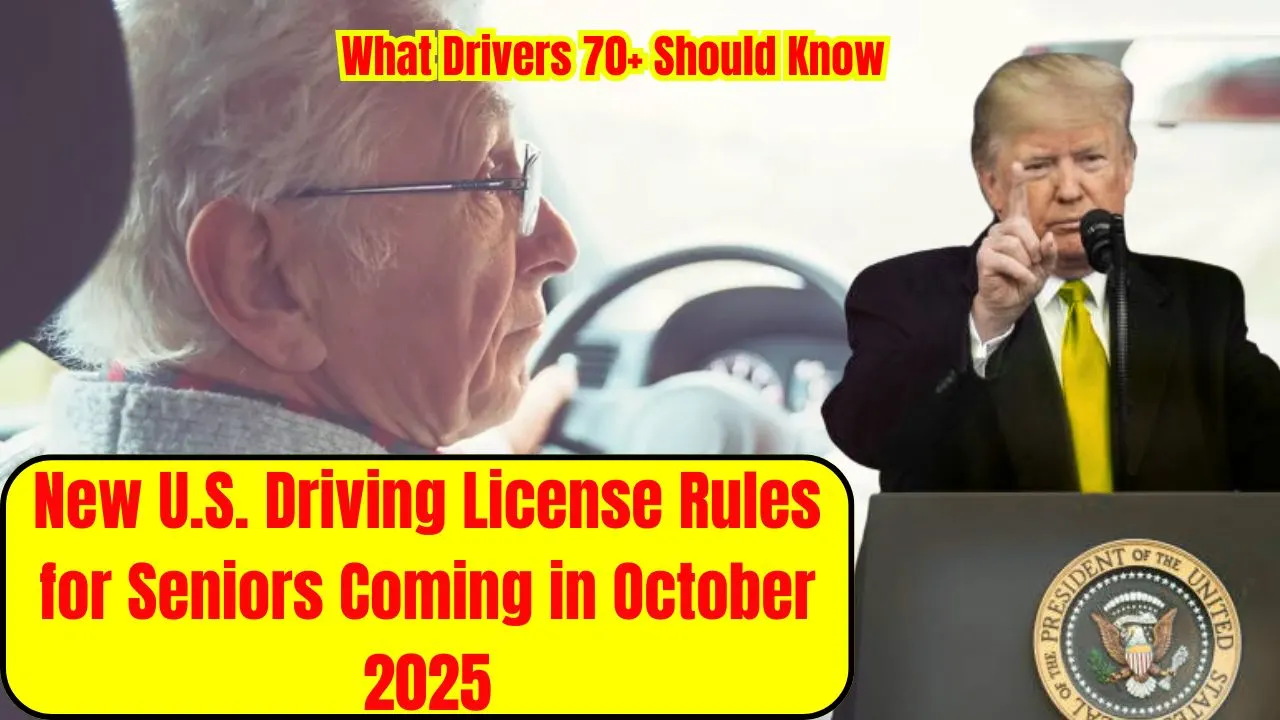If you’re over 70 and you’ve been hearing buzz about sweeping changes coming in October 2025, you’re not alone. The rumors say that Driving License Rules for Seniors are about to get stricter with more frequent renewals, mandatory tests, and tougher health checks. It’s enough to make anyone over 70 sit up and take notice.
In this post, I’m going to break down what’s real, what’s speculative, and what you should do to stay ahead of any changes. You’ll get a clear look at how the new Driving License Rules for Seniors might affect you or someone you care about and which state rules already matter today.
Understanding the Driving License Rules for Seniors
The upcoming Driving License Rules for Seniors are designed to ensure that elderly drivers remain safe and capable behind the wheel without losing their independence. These rules emphasize regular health checks, in-person renewals, and cognitive or vision testing for those over 70. The goal isn’t to take licenses away but to promote safety for all road users. As the U.S. population ages, such steps are being reviewed to balance public safety with personal freedom, ensuring that senior drivers continue driving confidently and responsibly.
Driving License Rules for Seniors: What’s Claimed vs. What’s True
Below is a quick overview of the claims circulating in media and social posts about the 2025 changes, contrasted with what’s been verified so far by trusted sources.
| Claim / Rule | What People Are Saying | Verified or Disputed |
| Nationwide federal law kicking in October 2025 | Some posts say the U.S. Department of Transportation will enforce a uniform set of rules for drivers over 70 | Disputed no such federal law has been passed |
| Mandatory vision, cognitive, and medical checks at renewal | Reports claim almost everyone 70+ will need tests | Partially true in some states; not universal |
| More frequent renewals by age group | For example, 70–79 every 4 years, 81–86 every 2, 87+ every year | Proposed in media, but not confirmed as law |
| Road tests for oldest drivers or flagged drivers | Some rumors claim 87+ or those with health flags must pass a driving test | State-level proposals exist; not confirmed nationwide |
| Restricted driving privileges (daylight only, local roads) | Proposed in some viral posts | Mentioned in rumors, but not verified as adopted law |
New U.S. Driving License Rule for Seniors Begins August / July 2025
The phrase New U.S. Driving License Rule for Seniors has been used widely in news stories, claiming changes start in August or July 2025. These reports suggest a move toward ability‑based renewals rather than arbitrary age cutoffs. Some sources even outline tiered license renewal systems, mandatory tests, and health screenings. But the important reality is no official federal confirmation currently supports such sweeping mandates. Still, with state rules already in place or changing, many seniors may see aspects of these ideas in local DMV changes.
The Rumor vs. Reality
Rumor: A new federal law controlling all senior renewals
Many widely shared posts claim there’s a new law mandating cognitive and health tests for drivers 70+, starting October 2025. That’s been debunked by fact-checkers. No clear legislative record supports a sweeping federal mandate yet.
Reality: States already enforce stricter rules for older drivers
Some states already require in-person renewals, vision tests, or more frequent renewals for older drivers. In California, for example, once you hit 70, you must renew in person and pass a vision exam. Virginia forces those 75+ to appear in person and undergo vision screenings. Illinois recently updated a law raising the age for mandatory annual road testing from 79 to 87. These real changes at the state level may be fueling broader rumors.
Reality: The rumors exaggerate many claims
Not every driver 70+ will face every test or restriction. Most rumors treat these rules as absolute, but real implementations typically include discretion, exemptions, and conditions.
What Might Change Under Proposed Rules
Even though nothing is guaranteed, here are some changes that many reports suggest could become more common:
- More frequent renewals: Instead of standard 4–8 year renewals, some seniors might be asked to renew every 2 or 4 years, depending on age.
- In-person renewal requirement: No more renewing entirely online for seniors DMVs would want to do checks in person.
- Vision and cognitive screenings: These would help identify whether someone’s eyesight, reaction times, or decision making are still safe.
- Road tests for highest age groups or flagged drivers: If someone has health concerns, accidents, or advanced age, a behind‑the‑wheel test might be required.
- Restricted driving privileges: Some may only be allowed to drive during daylight, or within a certain radius from home.
- Medical fitness certificate: A doctor may need to confirm that a driver is physically and mentally able to continue driving.
Steps Drivers 70+ Should Take Now
- Check your state DMV website
Before worrying about federal rules, see what your state already requires. - Keep vision and health up to date
Get regular eye exams and monitor conditions like diabetes or neurological changes. - Practice cognitive and reaction drills
Simple brain and reflex games can help. - Try a senior driving safety course
Many states and insurers offer these, and they may help you spot weak points or reduce insurance costs. - Stay on top of news and official notices
Local state DMVs will publish changes before rules apply. - Plan alternative transportation
If rules become stricter, having backup options (public transit, rideshare, family help) helps protect your independence.
State Examples & Variations
- California: Drivers 70+ must renew in person and pass a vision test. Some renewal steps can be started online.
- Virginia: Once you’re 75 or older, you must do renewals in person and complete vision checks.
- Illinois: Under a new law effective July 2026, drivers age 87+ will face yearly road tests; those aged 79–86 still have to renew in person but don’t need a driving test annually.
- Pennsylvania: Seniors aged 65+ may choose between 2‑year or 4‑year license renewals.
These examples show how flexible and varied senior driving rules already are.
Final Thoughts
If you’re 70 or over, waking up to the possibility of stricter rules can feel uneasy but with clarity and preparation, you can stay ahead. Rather than panic over rumors, check your state’s DMV, keep your health sharp, and maintain flexibility in how you travel.
FAQs
No. Age itself is not a reason for automatic revocation. The key is whether you pass the required tests, where required.
No, as of now, no federal law mandates these changes. Many media claims remain rumors.
Vision exams are the most commonly mentioned. Some proposals include cognitive screening, medical exams, or even road tests if your driving record or health suggests risk.
That variation is expected. States retain control over DMV rules, so what you face depends heavily on where you live.
Stay informed, maintain your health (especially eyesight and cognitive fitness), consider senior driving courses, and monitor your state DMV’s official announcements.







